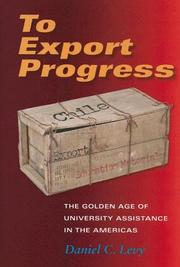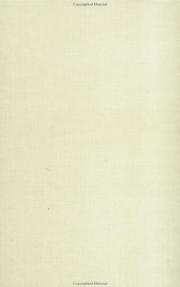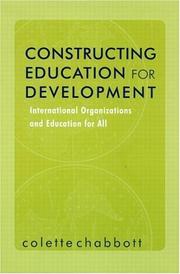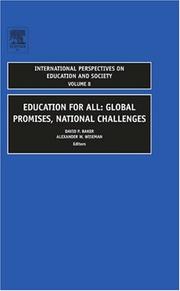| Listing 1 - 9 of 9 |
Sort by
|

ISBN: 1282071777 9786612071775 0253111404 9780253111401 0253345774 9780253345776 0253345774 9780253345776 9781282071773 661207177X Year: 2005 Publisher: Bloomington Indiana University Press
Abstract | Keywords | Export | Availability | Bookmark
 Loading...
Loading...Choose an application
- Reference Manager
- EndNote
- RefWorks (Direct export to RefWorks)
"An immensely valuable and detailed analysis of foreign, mainly American, assistance to Latin American higher education, To Export Progress provides an understanding of the 'what' and the 'why' of foreign aid to a key sector. This book will be a classic in its field." -- Philip G. Altbach, Monan Professor of Higher Education, Boston College "Professor Daniel C. Levy, a leading authority in the field of higher education and the nonprofit sector in Latin America, once again has opened an otherwise neglected field through his carefully researched and reported study of philanthropic support for university reform in the region. Drawing on a wealth of archival material, documentary evidence, interviews, and first hand experience with the actors and agencies involved, To Export Progress illuminates the vision and ideals inspiring international agencies, as much as the realities they confronted in deciding on grants and loans policy, from the 1960s to the 1980s. The book is strongly recommended for scholars and students of international education, for Latin American experts, and for philanthropic managers and educational administrators in the developing world." -- Jorge Balan, Senior Program Officer for Higher Education, The Ford Foundation. In this study of the attempts to export the modern Western university, its ideas, and its form to the Third World, Daniel C. Levy examines the development assistance provided by the Ford Foundation, the U.S. Agency for International Development, and the Inter-American Development Bank and their relations with local partners in Latin America in the 1960s and 1970s. Levy considers the funders, how they selected partners, which countries and institutions were favored, and to what effect. Based on meticulous research and careful analysis, the book provides a detailed look at philanthropic assistance to the region during the era of modernization and development in Latin America.

ISBN: 131581109X 1317794508 9781317794516 1317794516 9781317794509 9781315811093 9780415934046 0415934044 0415762308 1317794494 9780415762304 9781317794493 Year: 2016 Publisher: London
Abstract | Keywords | Export | Availability | Bookmark
 Loading...
Loading...Choose an application
- Reference Manager
- EndNote
- RefWorks (Direct export to RefWorks)
Educational assistance, Japanese --- Education and state --- Education --- Children --- Education, Primitive --- Education of children --- Human resource development --- Instruction --- Pedagogy --- Schooling --- Students --- Youth --- Civilization --- Learning and scholarship --- Mental discipline --- Schools --- Teaching --- Training --- Japanese educational assistance --- History --- Political aspects --- International cooperation

ISBN: 1136543244 0203055993 9781136543241 9780203055991 0815338295 9780815338291 9780415874991 0415874998 9781136543319 9781136543388 1136543317 Year: 2003 Publisher: New York
Abstract | Keywords | Export | Availability | Bookmark
 Loading...
Loading...Choose an application
- Reference Manager
- EndNote
- RefWorks (Direct export to RefWorks)
Book
ISBN: 9781760466169 1760466166 Year: 2024 Publisher: Canberra : ANU Press,
Abstract | Keywords | Export | Availability | Bookmark
 Loading...
Loading...Choose an application
- Reference Manager
- EndNote
- RefWorks (Direct export to RefWorks)
Mandates and Missteps is the first comprehensive history of Australian government scholarships to the Pacific, from the first scheme in 1948 to the Australia Awards of 2018.
Educational assistance --- Pacific Islanders --- Scholarships --- Students, Foreign --- Aide à l'éducation --- Océaniens --- Bourses d'études --- Education --- Éducation --- Australia --- Australie --- Foreign economic relations --- Relations économiques extérieures
Book
ISBN: 1283579014 9786613891464 900423540X 9789004235403 9781283579018 9789004228993 9004228993 6613891460 Year: 2012 Publisher: Leiden Boston M. Nijhoff Pub.
Abstract | Keywords | Export | Availability | Bookmark
 Loading...
Loading...Choose an application
- Reference Manager
- EndNote
- RefWorks (Direct export to RefWorks)
In International Copyright Law and Access to Education in Developing Countries: Exploring Multilateral Legal and Quasi-Legal Solutions , Susan Isiko Štrba offers an understanding of the legal relationship between copyright regulation and access to education in developing countries, and explores both institutional and normative ways to facilitate access to printed educational and research materials.
Copyright --- Copyright, International. --- Educational law and legislation --- Educational assistance --- Compulsory school attendance --- Education --- Education, Compulsory --- Education, Elementary --- Law, Educational --- Public schools --- School law --- Schools --- Public institutions --- Literary property --- Property, Literary --- Intangible property --- Intellectual property --- Anti-copyright movement --- Authors and publishers --- Book registration, National --- Patent laws and legislation --- International copyright --- Law and legislation

ISBN: 1281049174 9786611049171 1849505047 0080478638 9781849505048 0762314419 9780080478630 9780762314416 Year: 2009 Publisher: Bingley Emerald Group Publishing Limited
Abstract | Keywords | Export | Availability | Bookmark
 Loading...
Loading...Choose an application
- Reference Manager
- EndNote
- RefWorks (Direct export to RefWorks)
Since the World Conference on Education for All (EFA) in Jomtien, Thailand in 1990, the push for modern mass schooling has become a primary focus of national education policymakers and researchers around the world. The EFA declaration that grew out of this conference served as a culmination of a century-long movement to transform existing national educational systems into the most comprehensive mass system of schooling ever devised. Comparative education researchers have been studying both the promises and the challenges surrounding EFA for decades, but in comparative education research literature there is still neither consensus on the impact that EFA has nor clearly identified global trends in either EFA policymaking or policy implementation. It seems that for every promise that EFA brings, there is an accompanying challenge.It is this struggle between the global promises and the national challenges that this volume of "International Perspectives on Education and Society" seeks to identify and explain. Chapters range from critical syntheses of EFA policymaking or policy implementation to original comparative education research on the impact that EFA has had in specific nations or across clusters of nations. It compares and contrasts the promises of EFA v. implementation of policy. The international contributions ensure global coverage of content. It is part of the "International Perspectives on Education and Society" series.
Education --- Educational assistance --- Basic education. --- Educational equalization. --- International cooperation. --- Aims and objectives. --- Educational inequality --- Equal education --- Equal educational opportunity --- Equalization, Educational --- Basic skills education --- Aims and objectives of education --- Educational aims and objectives --- Educational goals --- Educational objectives --- Educational purposes --- Goals, Educational --- Instructional objectives --- Objectives, Educational --- Purposes, Educational --- Affirmative action programs in education --- Underprepared college students --- Educational sociology --- Aims and objectives --- Educational equality --- Educational equity --- Equality of education --- Equity, Educational --- Inequality, Educational --- Opportunity, Equal educational --- Education. --- General.
Book
ISBN: 9780199584987 0199584982 9789231041297 9231041290 Year: 2010 Publisher: Paris Oxford Unesco Oxford University Press
Abstract | Keywords | Export | Availability | Bookmark
 Loading...
Loading...Choose an application
- Reference Manager
- EndNote
- RefWorks (Direct export to RefWorks)
Education systems in many of the world's poorest countries are now experiencing the aftermath of the global economic downturn. This report argues that the crisis could create a lost generation of children whose life chances will have been irreparably damaged by a failure to protect their right to education. It examines who these children are and why they are being left behind, and looks at concrete solutions for making sure that no children are excluded from schooling.--Publisher's description.
Gelijke onderwijskansen --- Rechten van het kind --- Inclusie --- Inclusief onderwijs --- Economische crisis --- UNESCO --- Onderwijsbeleid --- Education --- Educational assistance --- Education and state --- Basic education --- Fundamental education --- Poor children --- Kansarme jeugd ; onderwijs --- Global Financial Crisis, 2008-2009 --- Global Economic Crisis, 2008-2009 --- Subprime Mortgage Crisis, 2008-2009 --- Financial crises --- Children of the poor --- Economically disadvantaged children --- Children --- Community development --- Basic skills education --- Underprepared college students --- Education policy --- Educational policy --- State and education --- Social policy --- Endowment of research --- Foreign aid to education --- Foreign educational aid --- Technical assistance --- International cooperation --- Social aspects --- Education&delete& --- Finance --- Economic conditions --- Government policy --- Education for All (Project) --- EFA --- Global Financial Crisis (2008-2009) --- Statistics --- Periodicals. --- Kinderrechten --- Unesco --- Digitale kloof --- Ondersteuning --- Samenleving --- Nederland --- Kust
Book
ISBN: 9789812874566 9812874550 9789812874559 9812874569 Year: 2015 Publisher: Singapore : Springer Singapore : Imprint: Springer,
Abstract | Keywords | Export | Availability | Bookmark
 Loading...
Loading...Choose an application
- Reference Manager
- EndNote
- RefWorks (Direct export to RefWorks)
This book provides an Asian perspective on the timely, urgent questions of how international education aid and development should move forward and what development roles Asia should play, especially following the end of the UN Millennium Development Goals (MDGs) and Education for All (EFA) in 2015. To answer these questions, four separate but interwoven parts, which analyze and anchor education MDGs and EFA policies and practices by means of diverse case studies of donor states, recipient states, and states with a dual and transitional role in Asia, are addressed. On the basis of the analyses, a clearer and concrete direction for effectively and sustainably extending international education aid and development beyond 2015 can be derived.
Education. --- International and Comparative Education. --- Educational Policy and Politics. --- Administration, Organization and Leadership. --- Education --- Social Sciences --- Theory & Practice of Education --- Educational assistance --- Finance. --- Children --- Education, Primitive --- Education of children --- Human resource development --- Instruction --- Pedagogy --- Schooling --- Students --- Youth --- Foreign aid to education --- Foreign educational aid --- International education. --- Comparative education. --- School management and organization. --- School administration. --- Educational policy. --- ducation and state. --- Civilization --- Learning and scholarship --- Mental discipline --- Schools --- Teaching --- Training --- Technical assistance --- International education . --- Education and state. --- Global education --- Intellectual cooperation --- Internationalism --- Administration, Educational --- Educational administration --- Inspection of schools --- Operation policies, School --- Policies, School operation --- School administration --- School inspection --- School operation policies --- School organization --- Management --- Organization --- Education policy --- Educational policy --- State and education --- Social policy --- Endowment of research --- Education, Comparative --- Inspection --- Management and organization --- Government policy --- History
Book
ISBN: 9460919014 1283907895 9460919030 9460919022 Year: 2012 Publisher: Rotterdam ; Boston : Sense Publishers,
Abstract | Keywords | Export | Availability | Bookmark
 Loading...
Loading...Choose an application
- Reference Manager
- EndNote
- RefWorks (Direct export to RefWorks)
World Bank and Education: Book Blurb For more than three decades, the World Bank has been proposing global policies for education. Presented as research-based, validated by experience, and broadly applicable, these policies are ideologically driven, insensitive to local contexts, and treat education as independent of international dynamics and national and local economies and cultures. Target countries, needing resources and unable to generate comparable research, find it difficult to challenge World Bank recommendations. The World Bank and Education: Critiques and Alternatives represents a powerful challenge to World Bank proposals. Probing core issues—equity, quality, finance, privatization, teaching and learning, gender, and human rights—highlights the disabilities of neoliberal globalization. The authors demonstrate the ideological nature of the evidence marshaled by the World Bank and the accompanying policy advice. Addressing key education issues in developing countries, the authors’ analyses provide tools for resisting and rejecting generic policy prescriptions as well as alternative directions to consider. Robert Arnove, in his preface, says, “whether the Bank is responsive to the critiques and alternatives brilliantly offered by the present authors, the book is certain to influence development and education scholars, policymakers, and practitioners around the globe.”.
Education -- Finance. --- Education -- Political aspects. --- World Bank. --- Education --- Social Sciences --- Education - General --- Theory & Practice of Education --- Finance. --- Political aspects. --- Politics and education --- School finance --- Schools --- Finance --- Education. --- Education, general. --- Children --- Education, Primitive --- Education of children --- Human resource development --- Instruction --- Pedagogy --- Schooling --- Students --- Youth --- Civilization --- Learning and scholarship --- Mental discipline --- Teaching --- Training --- Educational assistance. --- Economic aspects. --- Foreign aid to education --- Foreign educational aid --- Technical assistance --- Világbank --- Banque internationale pour la reconstruction et le développement --- Mezhdunarodnyĭ bank dli︠a︡ rekonstrukt︠s︡ii i razvitii︠a︡ --- MBRR --- Sekai Ginkō --- Kokusai Fukkō Kaihatsu Ginkō --- Kukche Puhŭng Kaebal Ŭnhaeng --- Segye Ŭnhaeng --- IBRD --- Welt Bank --- Weltbank --- Banque mondiale --- Internationale Bank für Wiederaufbau und Entwicklung --- Banco Internacional de Reconstrucción y Fomento --- Banco Mundial --- B.I.R.D. --- BIRD --- Banca Internațională pentru Reconstrucție și Dezvoltare --- Mirovoĭ Bank --- Svitovyĭ Bank --- Svitovyĭ bank rekonstrukt︠s︡iï i rozvytku --- Verdensbanken --- Międzynarodowy Bank Rozwoju i Odbudowy --- Bank al-Dawlī lil-Inshāʼ wa-al-Taʻmīr --- Bank al-Dawlī --- Världsbanken --- Banca ricostruzione e sviluppo --- Banca di ricostruzione e sviluppo --- BIRF --- I.B.R.D. --- B.I.R.F. --- Shih chieh yin hang --- Shi jie yin hang --- International Bank for Reconstruction and Development --- World Bank Group. World Bank --- Thanākhān Lōk --- Bank Światowy --- Viśva Baiṅka --- Lōka Băṅkuva --- Ngân hàng Thế giới --- Vsemirnyĭ Bank --- Bank Dunia --- Msopʻlio Bankis --- Banca Mondială --- BM --- Prapañca Byāṅku --- Banca mondiale --- Banca internazionale per la ricostruzione e lo sviluppo --- Dhanāgār Bibhab Lok --- البنك الدولي --- بنك الدولي --- 世界銀行 --- 世界银行 --- 国際復興開発銀行 --- Dėlkhiĭn Bank --- Дэлхийн Банк --- Hamashkharhayin Banki --- Svetska Banka --- Wereldbank --- Internationale bank voor herstel en ontwikkeling
| Listing 1 - 9 of 9 |
Sort by
|

 Search
Search Feedback
Feedback About UniCat
About UniCat  Help
Help News
News